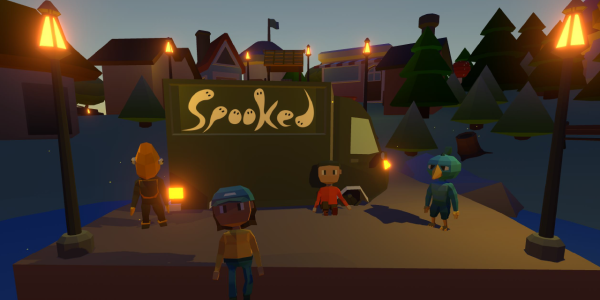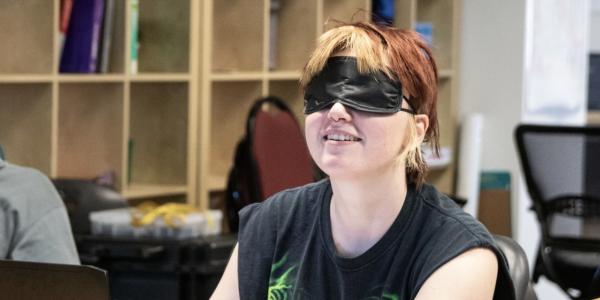 Arielle Dispenza was honored in December as the recipient of the 2021 Charles A. Hutchinson Memorial Teaching Award from CU Boulder's College of Engineering and Applied Science.
Arielle Dispenza was honored in December as the recipient of the 2021 Charles A. Hutchinson Memorial Teaching Award from CU Boulder's College of Engineering and Applied Science.
Dispenza, a teaching assistant professor who joined the College of Engineering and Applied Science faculty in 2016, is director of undergraduate programs for the ATLAS Institute, where she oversees the Creative Technology and Design program. Alongside her administrative duties, she teaches web design and development; physical computing; 3D design; and senior capstone projects.
An alumna of CU Boulder with a major in environmental design, Dispenza completed a minor in Technology, Arts & Media, the forerunner of the CTD program. After earning a master’s degree from NYU’s Interactive Telecommunications Program, Dispenza returned to CU Boulder to teach at the ATLAS Institute, where she's helped shape the major she wished existed when she was a student.
As a creative technologist and educator, Dispenza consistently shares her passion for emerging technologies and design, including user research, experience design, physical computing, universal design, computation and art. She also encourages out-of-the-box thinking, creative problem solving and empowering students to be active creators of technology. Dispenza also distinguishes herself as a tireless advocate for student welfare, skill acquisition and professional development.
In the interview that follows, Dispenza discusses how she implements her core values into her teaching practice.
What is your teaching philosophy?
My teaching philosophy is guided by five core values that are deeply integrated with one another—making, initiative, inclusion, collaboration and self-reflection. My goal is to empower students by not only requiring that they master academic content in the abstract but to also apply it in practical, creative ways.
Can you elaborate a little on what you mean by inclusion?
When I was in high school, I was diagnosed with a learning disability, so I know firsthand the need for inclusive course policies and learning materials that accommodate different kinds of learners. I develop a wide variety of learning materials in my classes—written lessons, recorded videos, a library of code examples and live-technical demos—and I am available for individualized support when necessary. My goal is to give students all the resources they need to succeed. The pandemic has made this harder, necessitating a wider range of resources, support and compassionate understanding for unique student circumstances.
How do you go about putting your core values into action?
I believe my role as an educator is to provide a container in which students can freely explore. This approach contradicts the traditional schooling system in many ways, but I believe it is the foundation for cultivating excitement and initiative in the learning process. I typically frame each lesson with a topic that we build understanding around. I then challenge students to apply and integrate the topic through a hands-on project or activity. It’s an open-ended way for them to practice what they have learned, demonstrating both technical and conceptual understanding.
Can you give a specific example?
For the Creative Technology and Design major, students take a class we call “Object.” It’s an introduction to physical computing using microcontrollers, and we spend time each week discussing high-level concepts and ideas, after which, students have the opportunity to apply the concepts discussed through building actual circuits and interactive technologies in response to open-ended prompts and an end-objective. Students must independently devise a way to demonstrate what they’ve learned by coming up with a way to use the knowledge to solve a problem or create a delightful experience.
What do your students think of this approach?
This approach can be disorienting for students. At the start of the semester, students sometimes push back. Having been told what to do in most classes in the past, it can be disarming to be given unlimited freedom to create. However, by the end of the class students have gained confidence with both the material as well as the creative process, and over and over I receive feedback on how much they’ve loved the class and on how much they learned.
In terms of reflection as a core value, how is it implemented in your classes?
Students in my classes are required to reflect on what they’ve learned and their class performance. For each major project, they are also required to submit self-reflection documents where they comment on their process, including where they were successful and where they were challenged. These written reflections often provide meaningful context on how to improve the course or better support students, while reminding students that they are ultimately responsible for their own learning experience.
You clearly care about your students’ future success. What do you hope they carry from your classes throughout their lives?
I hope my students become lifelong learners. Especially in the technology space, my goal is to empower them to become innovative leaders and active participants and creators, not just passive consumers.





